As the 21st century marches forward, the world finds itself at the threshold of an unprecedented technological revolution driven by Artificial Intelligence (AI). AI is permeating various aspects of our lives, from personal assistants on our smartphones to autonomous vehicles and advanced medical diagnostics. While these innovations offer tremendous potential for societal advancement, they also raise significant ethical, societal, and safety concerns. That’s why the need for robust AI governance has become paramount in safeguarding humanity’s well-being and shaping the trajectory of AI development responsibly. In this article, our MSP in Melbourne takes a look at what AI governance is all about.
Ensuring ethical AI practices
AI technologies possess immense capabilities, but they can also be subject to biases, discrimination, and ethical lapses. Without proper governance, AI systems could perpetuate existing societal inequalities or inadvertently violate individual rights and privacy. AI governance mechanisms play a crucial role in establishing guidelines and standards to ensure ethical AI practices, promoting transparency, fairness, and accountability throughout the development and deployment process.

Mitigating economic disruptions
The widespread adoption of AI can lead to economic disruptions, displacing certain job roles and creating new demands for skilled workers. Without adequate governance, there is a risk of leaving vulnerable populations behind and deepening socioeconomic divides. Effective AI governance fosters strategies for upskilling and reskilling the workforce, ensuring a smooth transition to an AI-powered economy, and fostering inclusive growth.
Balancing safety and progress
AI technologies have the potential to revolutionise industries such as healthcare, transportation, education, and finance. However, a misstep in the development and deployment of AI systems could result in catastrophic consequences. AI governance focuses on striking the delicate balance between fostering innovation and ensuring stringent safety measures. It encourages robust testing, continuous evaluation, and clear regulations to safeguard against unintended negative outcomes.
Addressing privacy and security concerns
AI-driven applications often deal with vast amounts of personal data, raising serious concerns about data privacy and security. Without proper governance, the misuse or mishandling of data can lead to significant breaches of individual privacy and even facilitate cybercrime. Effective AI governance mandates the implementation of data protection regulations, data anonymisation, and secure storage protocols to mitigate these risks and build public trust in AI technologies.
Promoting international cooperation
The development and deployment of AI are not confined by national borders. The global nature of AI necessitates international cooperation and harmonised governance frameworks to prevent discrepancies and jurisdictional conflicts. Collaborative governance initiatives facilitate the sharing of best practices, research, and collective efforts to address global challenges related to AI, such as climate change, healthcare, and disaster response.

Averting AI arms race
AI’s dual-use nature has significant implications for military applications and autonomous weaponry. The lack of effective AI governance could trigger an arms race, leading to the development of autonomous weapons with the potential for dire consequences. Establishing international agreements and treaties to regulate the development and use of AI in military contexts can prevent the escalation of such conflicts and reduce the risks associated with AI-enabled warfare.
Preserving human autonomy
While AI systems can assist decision-making, there is an inherent risk of ceding too much control and responsibility to machines. AI governance strives to preserve human autonomy by setting clear limits on AI decision-making authority and defining human oversight mechanisms. This approach ensures that AI serves as a tool to augment human capabilities, essentially helping your people do their best work, rather than replace them entirely.
Anticipating unintended consequences
As AI becomes more complex and autonomous, there is a growing concern about unforeseen consequences arising from its interactions with human society and the environment. AI governance fosters interdisciplinary research, algorithmic transparency, and continuous monitoring to detect and address potential negative consequences before they become widespread.
As you can see, AI governance is not merely a bureaucratic formality but a fundamental necessity in shaping the future of AI in a manner that aligns with human values, ethics, and well-being. By establishing ethical guidelines, ensuring transparency, promoting safety, and addressing privacy concerns, AI governance provides a safeguard against potential risks while maximising the vast potential of AI technologies for the betterment of humanity. It calls for collaboration among governments, industries, academia, and civil society to create a cohesive global framework that facilitates responsible AI development and deployment, ultimately empowering society to harness the transformative power of AI for the collective good.
Get IT investment strategy guidance on AI tech from Melbourne’s best MSP
Every industry can benefit from strategic tech investment, especially in terms of utilising AI, but there is a mountain of products, services, and providers out there to sift through. At Otto, an ISO27001 certified MSP, we’ll help you develop your IT investment strategy, optimising for cost and ROI. We’re also here to help you put tech into action as a small business, helping design and lead your project, get stakeholder and employee support, and align best-case solutions with your goals.




